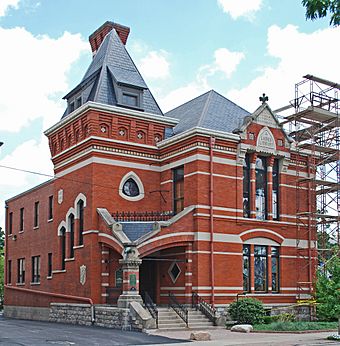Ladies Library Association Building facts for kids
Quick facts for kids |
|
|
Ladies Library Association Building
|
|
|
U.S. Historic district
Contributing property |
|
 |
|
| Location | 333 S. Park Street, Kalamazoo, Michigan |
|---|---|
| Built | 1879 |
| Built by | Frederick Bush |
| Architect | Henry Lloyd Gay |
| Architectural style | Venetian Gothic Revival |
| Part of | Bronson Park Historic District (ID83000855) |
| NRHP reference No. | 70000274 |
| Added to NRHP | July 8, 1970 |
The Ladies Library Association Building in Kalamazoo, Michigan is a very special place. It was the first building in the United States built specifically for a women's club. It was also the first building owned by a women's group in the entire country! The Ladies' Library Association of Kalamazoo (LLA) raised money to build it in 1879.
Contents
A Look at Its History
The Ladies' Library Association of Kalamazoo started in 1852. Their main goal was to help their members learn more and get a better education. For many years, the group did not have its own building. They focused on building up their library collection instead.
Building a Home for Learning
In 1878, the Association decided it was time to build a library. They worked hard to raise enough money for the project. Construction began the very next year, in 1879. A kind, long-time member named Ruth Webster donated the land for the building.
The building was designed by an architect from Chicago, Henry Lloyd Gay. Frederick Bush was the builder who made the plans come to life. Later, in 1913, a kitchen area was added to the building.
Recognized as a Historic Place
The Ladies Library Association Building became a Michigan State Historic Site in 1961. This means it was recognized as an important historical place in Michigan. It was also added to the National Register of Historic Places in 1970. This is a list of places across the country that are important to American history.
What It's Like Today
The Ladies Library Association Building is still used by the Ladies' Library Association of Kalamazoo. They continue their work there today. In 2013, the LLA finished a big project to restore the building. They made sure it met all modern safety rules. In 2015, the building received the State History Award for its amazing restoration work.
Building Design and Features
The Ladies Library Association Building is made of red brick and has two stories. The main part of the building is about 30 feet wide and 60 feet long. It has a tall tower attached to it, which is about 14 feet by 18 feet. A two-story kitchen section was added later behind the tower.
Architectural Style
The building is designed in the Venetian Gothic Revival style. This style often includes details inspired by old buildings in Venice, Italy. The roof is made of slate, and the building sits on a strong granite foundation. Light-colored stone is used for decoration all around the outside.
Special Details
You can see many beautiful details on the building. These include fancy ironwork, colorful tiles, and pretty stained glass windows. These features make the building truly unique and special.
 | Sharif Bey |
 | Hale Woodruff |
 | Richmond Barthé |
 | Purvis Young |


